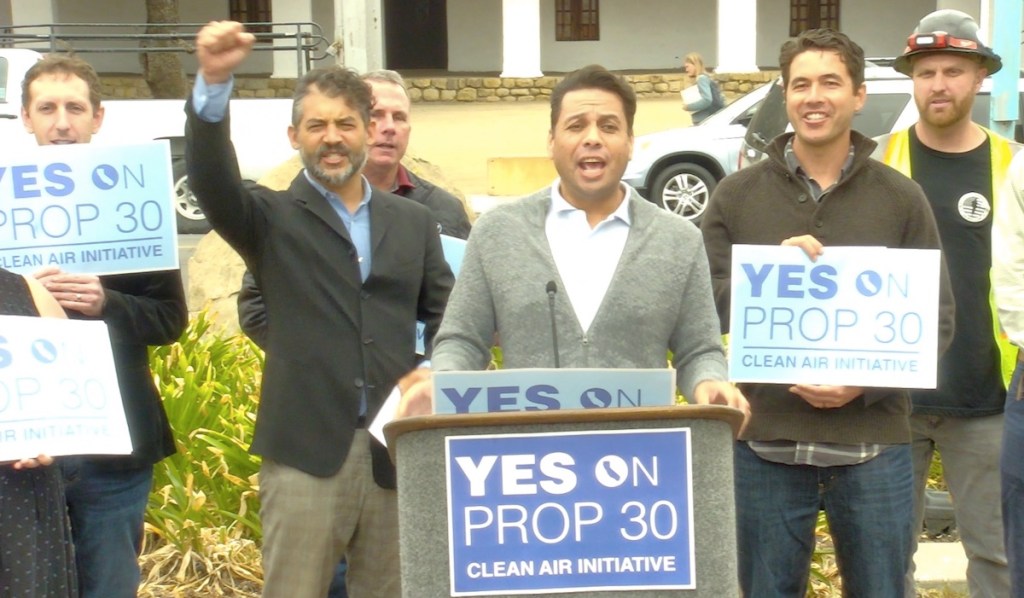If Prop. 30 were to pass, electric-vehicle charging stations would become as common as gas pumps, said Bill Baker, who manages Local 413 of the International Brotherhood of Electrical Workers. And California will need them. In August, the state required that by 2035 all new light cars and trucks sold in California be zero-emission ones, and, if Prop. 30 passes on November 8, it would raise $3 billion or more annually for the next 20 years to help residents pay for new zero-emission vehicles and to help fund the building of charging stations at apartment buildings, homes, and public places. The other proviso in Prop. 30 is that $700 million-$1 billion of the money raised per year would go to fight wildfires.
Baker was joined by County Supervisor Das Williams and several others at De la Guerra Plaza on Thursday to prompt the public to vote for Prop. 30. “We really cannot be serious about fighting climate change without electrifying our state with all due speed. Proposition 30 would do that,” Williams said. He noted that the barrier to electric vehicles for many households are the upfront costs and the necessity of a charging station at their home. Speaking of the skyrocketing price of gas, Williams said, “What kills me is knowing that so many people could have resistance to this inflation by getting into an electric vehicle.”
Michael Chiacos, the director of climate policy for the Community Environmental Council, noted that the 20-year span for Prop. 30 would be a boon. “The start-and-stop nature of state programs has hindered our ability to make electric vehicles available for all,” he said. It would also accelerate the transition to heavy-duty trucks, he said: “We need electric vehicles for working people, not just wealthy residents.”
According to the state Legislative Analyst’s Office, the go-to agency for unbiased information about ballot measures, the funds would come from an additional 1.75 percent added to taxpayers’ income more than $2 million. It acknowledges some taxpayers would “take steps to reduce the amount of tax they owe” to an unknown degree, but that $3.5 billion to $5 billion would be raised annually.
Sign up for Indy Today to receive fresh news from Independent.com, in your inbox, every morning.
The funding would be split 80 percent to zero-emission vehicles (ZEVs) and 20 percent to hire, train, and retain state firefighters. Of the ZEV portion, 45 percent would help households, businesses, and governments pay for the cost of cars, vans, and pick-up trucks, as well as payments to businesses and governments for heavy-duty trucks and buses. Charging stations would be installed and operated with 35 percent of the funds. In each ZEV category, at least 50 percent was to benefit people living near heavily polluted areas or in low-income communities. Among the zero-emission programs already in place in California, the Legislative Analyst notes that ride-sharing companies, like Uber and Lyft, are required “to use an increasing number of ZEVs for their services.”
Lyft has become a lightning rod for Prop. 30. Even Governor Gavin Newsom has spoken against Prop. 30 — which is backed by environmental groups, unions, and the California Democratic Party — claiming it is sponsored by “a single corporation to funnel state income taxes to benefit their company.” Lyft has reportedly donated $15 million toward Prop. 30.
At De la Guerra Plaza on Thursday, Newsom’s critique prompted Max Baumhefner with the Natural Resources Defense Council to state that was a false claim. “There is no carve-out for Lyft in Prop. 30. It is not there. The opposition cannot find it because it does not exist,” he said, adding, “99.8 percent of the funding in Prop. 30 would go to Californians who have nothing whatsoever to do with ride-sharing companies.” Baumhefner said that eliminating tailpipe emissions had an additional benefit: “According to the American Lung Association, by tackling these emissions, we would avoid 15,300 premature deaths, 440,000 asthma attacks, and 2.2 million lost work days.”
Support the Santa Barbara Independent through a long-term or a single contribution.

